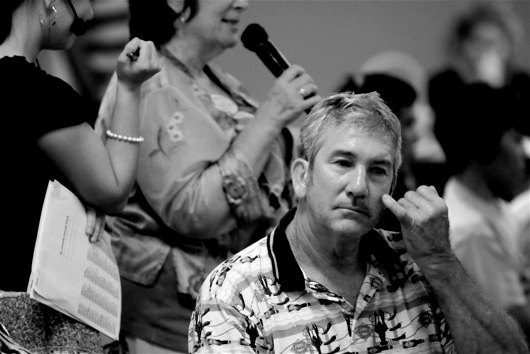Watching Grown Men Cry: Fear and Distrust in Mississippi
We’re rushing from Grand Isle, Louisiana to D’Iberville, Mississippi where our guide, Pat Heidingsfelder, along with the help of local community organizer Linda St. Martin, has set up a town hall style meeting with Gulf Coast shrimpers. It’s an uncanny mix of folks: half are Cajun, the other are from the Vietnamese community. But in this room, they all share something in common. They’re angry at the situation in their waters and they feel helpless to do anything about it.
What’s at the crux of this problem is distrust and confusion. I’m currently investigating the real effects of dispersants on the spill, talking with high level folks at NOAA fisheries and reading all that’s been recently published. Lots of info that’s coming out isn’t from peer reviewed sources and from my journalistic vantage, can’t be considered credible unless it is. Anecdotal evidence is important, but sound science is paramount.
Knee deep in uncertainty, here’s what I know: the truth of the toxicity of the water is remarkably more complex than the media has been portraying and lots of scientists, unqualified to speak to the implications of Corexit 9500 and 9527 are screaming at the top of their lungs on MSNBC. And it’s not helpful.
Rumor turns to fact once it disseminates across a community. Invariably it gets quoted by journalists looking for juice– and there are a lot of ambulance chasers and bloodsuckers here, journalistic and otherwise. But when that juice gets picked up by the Associated Press and spreads like a game of telephone all swooped up on SEO, it’s hard to unpack the truth. But few from the mainstream media give a crap about this. And people are suffering hard for it. It makes me angry, especially since I’m one who believes that truth is progress.
We’re in town right at the close of Brown Shrimp season and the opening of White Shrimp season. The fishermen talk about an ocean dead. They talk about getting sick from dispersants. They talk about finding oil in the water when Dr. Bill Walker, head of Marine Natural Resources for Mississippi says their is no oil in the water. They show videos of finding it three quarters of a mile offshore, in twelve feet of water.
What’s at stake is big. The seafood industry has collapsed in the Gulf because public perception is reality. And the reality is that it’s unsafe. And it may very well be. But that’s the point exactly– Walker has declared that fishing season is open, which by definition, means state officials are declaring that it’s safe (truth be, or truth be damned). But it also means that BP isn’t on the hook for lost days of work anymore. It means they can quit sending the loss of compensation checks. But if their are no shrimp and evidence of oil, these guys can’t sell their product, even if they can find it. And none of them want to sell stuff that will make people sick. When the facilitator asks who is buying right now, only one man raises his hand. But it’s a small, direct to sales buyer. In truth, there is no market (ask yourself, would you eat Gulf Seafood right now?)
To add insult to injury, these men are often divided on the issue. In the wake of a massive fisheries collapse, and when the oil was still spewing, several of these guys were hired by BP’s “Vessels of Opportunity” program to assist in the ‘incident response effort’ as BP somewhat equivocally named it. Half the men in this room have made a bucket full of cash (one guy made $200k in 74 days) by repurposing their boats for the BP cause. But others haven’t been hired. And they don’t know why. Truck sales are booming from BP money, and truck repossessions are rampant from out of work, un-BP-hired fisherman. The net result, and perhaps one of the most insidious facts I’ve uncovered during my time here, is that this divide affects this stakeholder groups’ ability to organize and appear as a unified front. And we all know what that means: a muffled voice.
As the evening progresses, I’m looking at the other members of our delegation, bearing witness, as I photograph everything. I haven’t seen this kind of emotion on people’s faces since watching airplanes fly into the World Trade Center. It’s heart wrenching and I feel dirty, ugly. And what’s even harder is that all I’ve done so far is become more aware of the truth of the situation– but the truth is so damn complex, that its meaning is lost.
This is a region in crisis. This is a world gone mad. But what’s even more hard on the heart is that what people desperately want, above all else, is to get back to how things were. But how it was isn’t sustainable. This is a never ending story. A chapter of infinity.
By Stiv Wilson




























NO COMMENT
Leave a comment